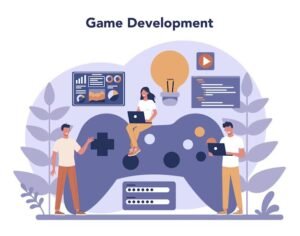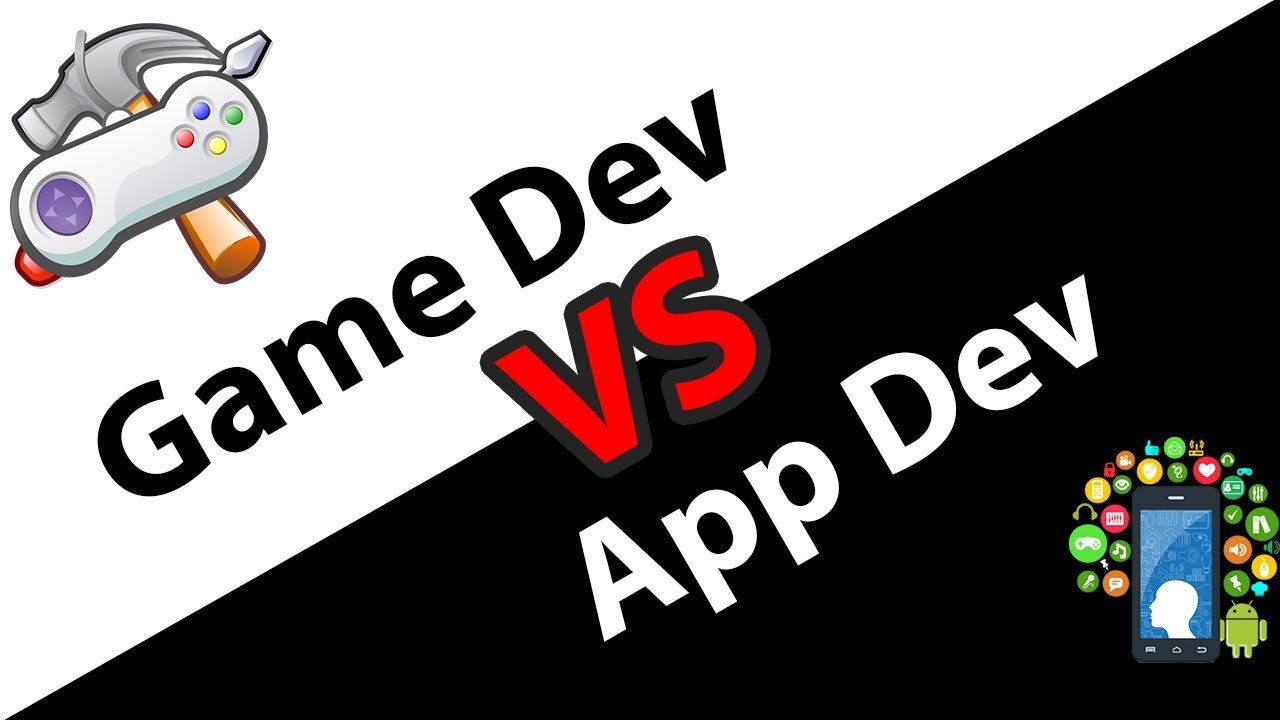Game Development VS Android App Development: Exploring the Differences
In the ever-evolving world of technology, the realms of game development and Android app development have emerged as dominant forces. Both game development and Android app development play a crucial role in shaping the digital landscape we experience today. However, these two fields have distinct differences when it comes to the development process, target audience, and overall objectives.
In this comprehensive guide, we will delve deep into the world of game development vs Android app development, exploring their nuances and uncovering the key differences between the two as well as benefits & future.
Understanding Game Development VS Android App Development:
Understanding Game Development:
Game development is a highly creative and technically demanding process that involves designing and building interactive experiences for gamers. Game developers utilize specialized tools, programming languages, and game engines to create captivating virtual worlds.

From 2D platformers to immersive open-world adventures, game developers bring the visions of game designers to life. The development process includes tasks such as coding game mechanics, designing graphics and animations, implementing sound effects, and optimizing performance for various gaming platforms.
Exploring Android App Development:
Android app development, on the other hand, focuses on creating applications for the Android operating system. Android developers leverage programming languages like Java or Kotlin and development tools like Android Studio to build apps that cater to the diverse needs of Android users.

The development process includes tasks such as designing user interfaces, implementing functionality, integrating APIs, and ensuring compatibility across a wide range of Android devices. Android app developers play a crucial role in enhancing the mobile experience by creating innovative and user-friendly applications.
Differences Between Game Development and Android App Development:
Target Audience and User Engagement:
One of the primary differences between game development and Android app development lies in their target audience and the level of user engagement they seek.
- Game developers often target a specific group of users, such as casual gamers, hardcore gamers, or fans of a particular genre. Games are designed to provide immersive experiences that captivate and entertain players for extended periods.
- On the other hand, Android app developers cater to a broader audience, creating apps that serve a variety of purposes, including productivity, social networking, e-commerce, and entertainment.
Design and User Interface:
Game development and Android app development differ significantly in terms of design and user interface considerations.
- Games typically require visually stunning graphics, animations, and sound effects to create an engaging and immersive experience.
- Game developers focus on creating captivating worlds, character designs, and memorable soundtracks that enhance the gameplay.
- In contrast, Android app development prioritizes user interface design that is intuitive, user-friendly, and optimized for mobile devices.
- App developers aim to create interfaces that are easy to navigate, functional, and aesthetically pleasing.
Development Tools and Technologies:
Game development and Android app development employ different sets of tools and technologies.
- Game developers often use specialized game engines like Unity or Unreal Engine, which provide comprehensive development environments and tools for creating games.
- These engines offer features such as physics simulations, rendering capabilities, and asset management systems that streamline the development process.
- Android app developers, on the other hand, utilize tools like Android Studio, Eclipse, or Visual Studio, along with programming languages like Java or Kotlin, to build Android applications.
- These development environments provide tools for designing user interfaces, writing code, debugging, and testing.
Monetization and Revenue Models:
Monetization strategies differ between game development and Android app development.
- Game developers often rely on monetization models such as in-app purchases, advertising, or offering premium versions of the game.
- In-app purchases can include items like virtual currency, power-ups, or additional levels. Advertising can take the form of in-game ads or rewarded videos.
- Android app developers, on the other hand, can generate revenue through various models such as in-app purchases, subscriptions, or advertisements.
- However, the focus of monetization in Android apps is often more diverse, with a wide range of app categories and revenue generation methods.
Market Dynamics and Competition:
The gaming industry and the Android app market have their unique dynamics and competitive landscapes.
- The gaming industry is highly competitive, with millions of games available across various platforms.
- Game developers face the challenge of standing out among the sea of games, capturing the attention of gamers, and retaining a loyal user base.
- On the other hand, the Android app market is equally competitive, with millions of apps vying for user attention on the Google Play Store.
- Android app developers need to create unique and valuable applications that solve specific user needs and offer a competitive advantage to succeed in this competitive landscape.

Benefits of Game Development:
- Creative Outlet: Game development provides a creative outlet for developers to bring their ideas to life. It allows them to design unique and immersive virtual worlds, characters, and stories. Developers have the freedom to explore their creativity and create interactive experiences that captivate players.
- Engaging and Interactive Experiences: Games offer a unique form of entertainment that actively engages players. Game development allows developers to create interactive experiences that provide entertainment, challenge, and a sense of achievement. Games have the power to immerse players in captivating narratives, foster social connections, and provide hours of enjoyment.
- Technological Advancements and Innovation: Game development often pushes the boundaries of technology and drives innovation. Game developers work with cutting-edge technologies, such as advanced graphics rendering, physics simulations, and artificial intelligence. This involvement with technology fosters innovation and contributes to advancements in various fields.
- Career Opportunities: The game development industry offers a wide range of career opportunities. From game designers and programmers to artists, animators, and sound engineers, there are various roles and specializations within game development. The demand for skilled game developers continues to grow, providing ample job prospects in the industry.
Benefits of Android App Development:
- Wide User Base and Market Reach: Android has a vast user base globally, making it an attractive platform for app developers. Developing apps for Android allows developers to reach a wide audience and tap into a global market. Android app development offers the potential for app visibility, user engagement, and revenue generation on a large scale.
- Diverse App Categories and User Needs: Android app development allows developers to create apps across a wide range of categories and cater to diverse user needs. From productivity and social networking to gaming and entertainment, there is a vast scope for app development on the Android platform. Developers can target specific niches or create apps that address broader user needs.
- Flexibility and Customization: Android provides developers with a high level of flexibility and customization options. The open-source nature of the Android platform allows developers to modify and customize the operating system, enabling them to create unique and innovative apps. This flexibility empowers developers to create apps that align with their vision and meet specific user requirements.
- Integration with Google Services and Ecosystem: Android app development seamlessly integrates with various Google services and the wider Android ecosystem. Developers can leverage Google services like Google Maps, Google Analytics, and Google Play Services to enhance their app’s functionality, performance, and user experience. This integration offers developers access to a range of tools and resources that can streamline app development and improve user engagement.
- Revenue Generation Opportunities: Android app development provides various revenue generation opportunities for developers. Through in-app purchases, subscriptions, advertisements, or premium versions of the app, developers can monetize their apps and generate income. The Google Play Store offers a global platform for app distribution, enabling developers to reach a large user base and monetize their apps effectively.
Future of Game Development:
- Advanced Graphics and Immersive Experiences: The future of game development will focus on pushing the boundaries of graphics and creating even more immersive experiences. With advancements in technology like ray tracing, real-time global illumination, and virtual reality (VR), games will offer stunning visuals and a more realistic and immersive gameplay environment.
- Cloud Gaming: Cloud gaming is set to revolutionize the gaming industry. It allows players to stream games directly to their devices without the need for high-end hardware. This technology will enable gamers to access a vast library of games on various devices, making gaming more accessible and reducing the barrier to entry.
- Cross-Platform Play and Progression: The future of game development will see an increased emphasis on cross-platform play and progression. Players will be able to enjoy games seamlessly across different platforms, including consoles, PCs, and mobile devices. This will allow for a more connected and inclusive gaming community.
- Artificial Intelligence and Procedural Generation: Artificial intelligence (AI) will play a significant role in the future of game development. AI-powered NPCs (non-playable characters) will become more realistic and responsive, enhancing the overall gameplay experience. Procedural generation techniques will also be used to create vast and dynamic game worlds, offering endless possibilities for exploration and gameplay.
Future of Android App Development:
- 5G Connectivity and IoT Integration: The rollout of 5G technology will revolutionize the capabilities of Android apps. Faster and more reliable internet connectivity will enable the development of apps that leverage real-time data processing and seamless integration with Internet of Things (IoT) devices. This will open up new possibilities for smart homes, connected cars, and wearable technology.
- Augmented Reality (AR) and Virtual Reality (VR): Android app development will see a significant growth in AR and VR applications. AR will enhance the user’s real-world environment with virtual objects, providing interactive and immersive experiences. VR will enable users to enter entirely virtual worlds, offering new avenues for gaming, education, training, and entertainment.
- Machine Learning and Personalization: Machine learning algorithms will be increasingly integrated into Android apps, allowing for personalized experiences. Apps will be able to analyze user behavior and preferences to deliver tailored content, recommendations, and suggestions. This will enhance user engagement and satisfaction.
- Enhanced Security and Privacy: As the importance of data privacy and security increases, Android app development will focus on implementing robust security measures. Developers will adopt encryption techniques, secure authentication methods, and data protection protocols to ensure user privacy and safeguard sensitive information.
- Instant Apps and Progressive Web Apps: Instant apps and progressive web apps (PWAs) will gain more prominence in the future of Android app development. Instant apps allow users to access app functionality without having to install the full app, reducing barriers to entry. PWAs offer the benefits of native apps while being accessible through a web browser, providing a seamless and responsive user experience.
FAQs:
- Is it possible to develop games for Android devices?
Yes, it is entirely possible to develop games specifically for Android devices. Android game development involves leveraging game engines and development tools like Unity, Cocos2d, or Godot to create games that are compatible with Android devices. Developers can utilize the Android SDK (Software Development Kit) and libraries to optimize game performance and ensure compatibility across a wide range of Android devices. - Can Android app developers also develop games?
Yes, Android app developers can acquire the necessary skills to develop games as well. Many game engines and development tools, such as Unity or Unreal Engine, offer support for Android game development. Android app developers can leverage their programming and development skills to create games for Android devices, allowing them to explore both the realms of app development and game development. - Which field offers better career prospects, game development or Android app development?
Both game development and Android app development offer promising career prospects. The choice between the two depends on individual interests, skills, and career aspirations. The gaming industry continues to experience significant growth, providing ample opportunities for skilled game developers. On the other hand, Android app development offers a vast and diverse market, with a wide range of app categories and user needs to cater to. Ultimately, individuals should consider their passion, skill set, and the market demand while making a decision.
Conclusion:
In conclusion, game development and Android app development are two distinct but interconnected fields within the realm of mobile technology. While both require creativity, programming knowledge, and technical skills, they differ in terms of target audience, design considerations, monetization strategies, development tools, and market dynamics.
Game development focuses on creating immersive and engaging experiences for gamers, while Android app development caters to a broad range of user needs through applications. Understanding the differences between game development and Android app development can help aspiring developers choose their career paths and navigate the exciting world of mobile technology.

